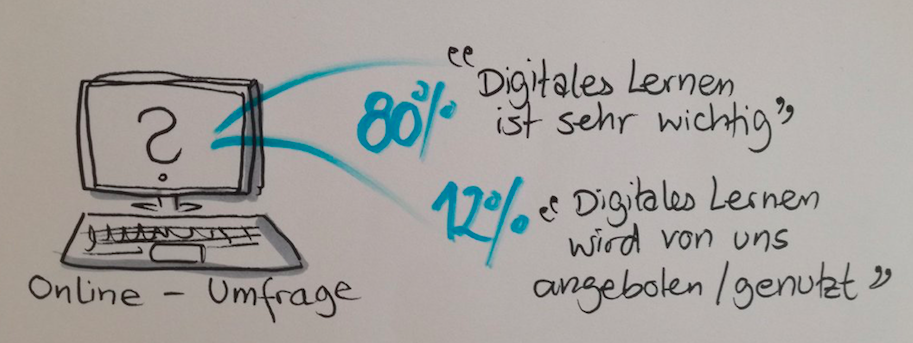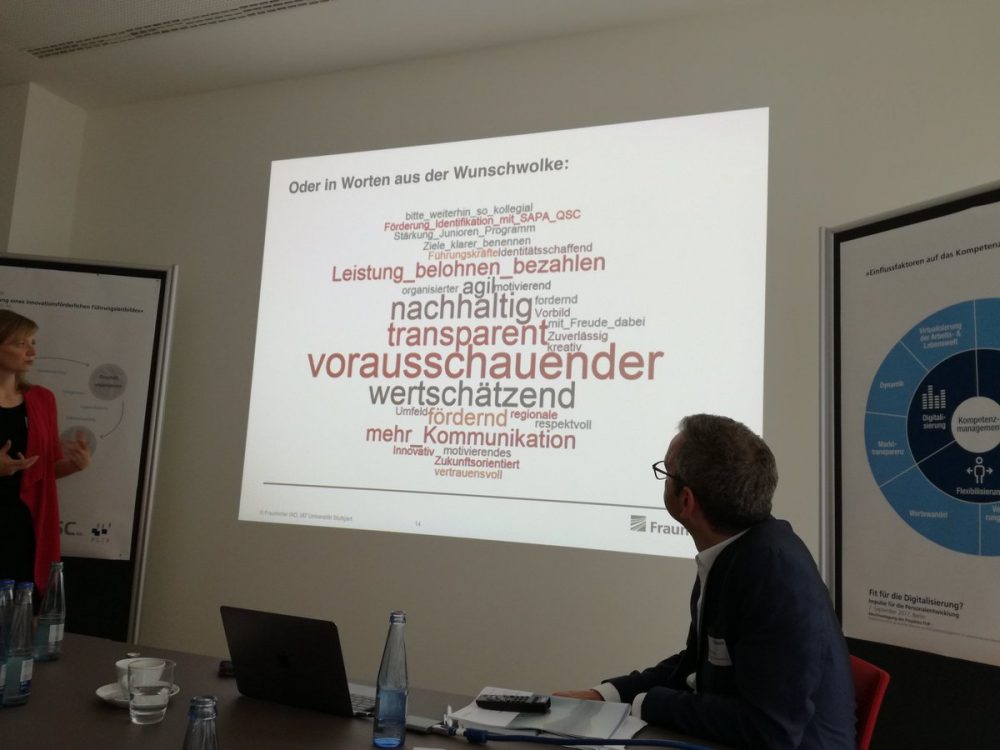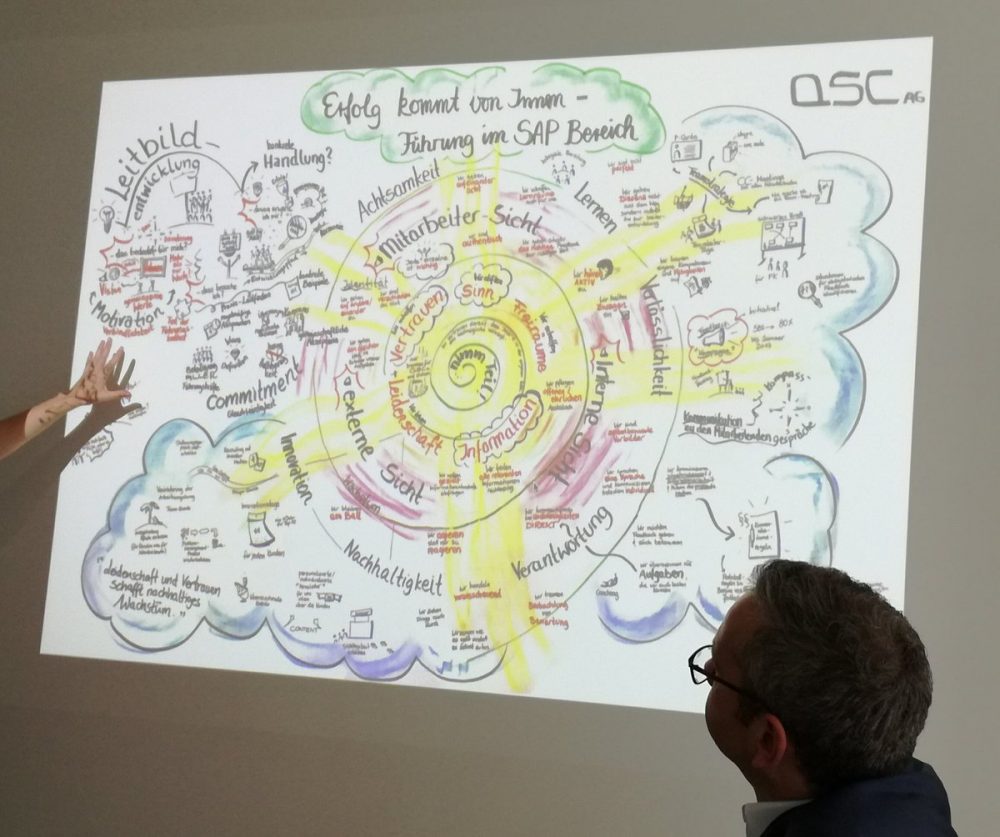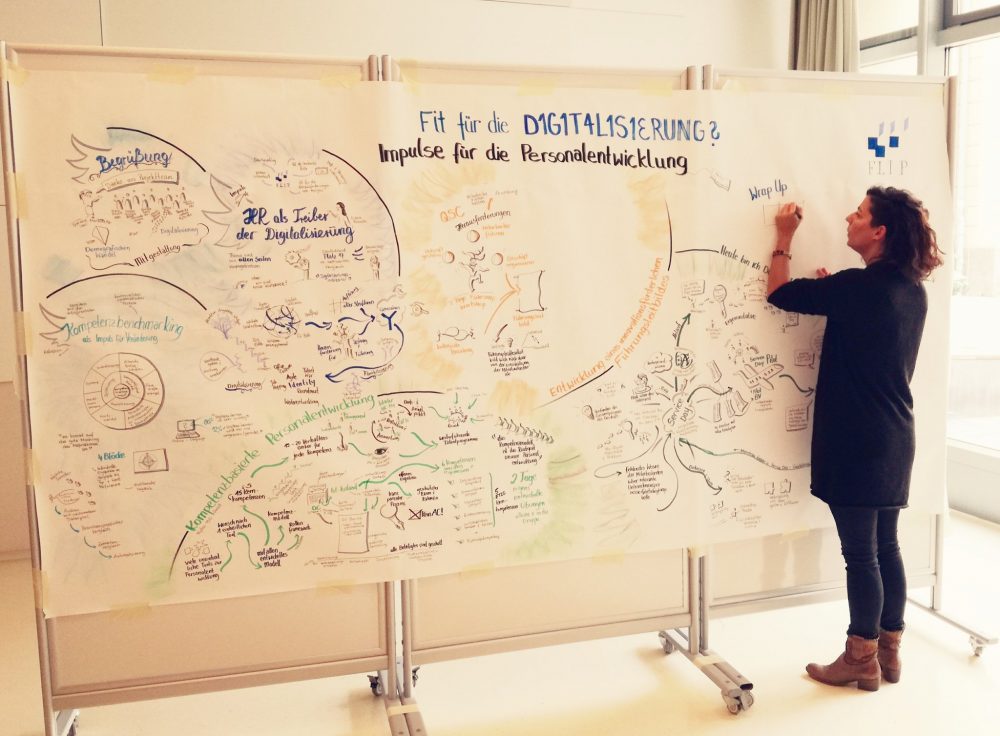 “Fit for digitization? Impulses for personnel development” was the topic of the event that bitkom and the Fraunhofer Institute hosted on September 7th, 2017. The program also concluded a 3-year research project and online survey by the FLIP joint project, with the central question: Are human resources and competence development fit for digitization?
“Fit for digitization? Impulses for personnel development” was the topic of the event that bitkom and the Fraunhofer Institute hosted on September 7th, 2017. The program also concluded a 3-year research project and online survey by the FLIP joint project, with the central question: Are human resources and competence development fit for digitization?
An appeal to the conference goers
The first lecture was under the provocative motto “HR as the driver of digitization,” and the question of whether this sentence should end with an exclamation point or question mark. Mrs. Roberts made a frank appeal to the human resources personnel: “Only if you understand the strength and effects of your steering will you win accordingly.”
That was a good start. I immediately thought about the book which I had just begun to read: “Human Collaboration Management: Personnel Manager as a Consultant and Designer in a Networked Working World.“ The author, Jan Weilbacher, writes:
“Most businesses are more or less concerned with digital transformation. (…) People need to be brought together, the divisive must be overcome, and collective intelligence must be used as best as possible. This development is the task of personnel management. They must feel responsible for effective co-operation across all borders, which requires something that has not yet been a hallmark of the staff: communication. ” (VIII, Prolog)
Where are companies located?
In order to find out what working initiatives already exist, a benchmarking tool was developed as part of the FLIP joint project. “Companies of the same size class,” can compare their respective personnel and competence management “to reflect their own positions, procedures and measures and to derive impulses for change.”
Stefanie Brzoska (bitkom) and Alexander Schletz (Fraunhofer Institute) presented the benchmarking tool as well as the results of the survey within the framework of FLIP. Ms. Brzoska began with a summary statement:
“The mixture of measures is important.”
On the topic of digital learning they also summarized:

More than 80% of companies see a great deal of importance in digital learning, but only 12% of companies implement it. This is similar to the use of social media.
Further results of the online survey can be viewed here: Fit for digital change?
Is digitization digital? Or analog?
In two thematic rounds, you could then exchange ideas with one of the FLIP partners: Melanie Baierl from QSC AG, Jennifer Bähner from Deutsche Telekom Kundenservice GmbH and Franziska Ludwig and Cathrin Frey from Fujitsu TDS GmbH.
The themes were not centered on digital tools – quite the opposite. What does it really mean if you want to take a big step forward? What is needed for change?
Immediately, an English-language contribution to LinkedIn by Christian Müller came to mind, it involves the relevance of digital training including social collaboration for digital change: Digital Transformation needs Digital Knowledge Management.
Core competences – already overtaken at the time of the presentation?
Ms. Ludwig and Ms. Frey from Fujitsu presented an orientation center (OC) to examine six core competencies among employees during a multi-day workshop. They were: decision-making skills, communication skills, leadership skills, customer orientation, integration skills and economic thinking and action. “Where is the digitization? And the competencies, which are necessary right now and especially in the future?” asked Gernot Kühn. The answer is exactly what Ludwig and Frey are working on. After the model has been introduced successfully with these competencies and is reflected in the entire company structure, digital competencies can begin to be identified to expand the OC.
Core values - what is important for employees?
Together with the Fraunhofer Institute, QSC AG has developed a guiding concept for innovation. First, the values and expectations of employees were collected: what do they expect and what is important to them?

In particular, terms such as “forward-looking”, “sustainable”, “transparent”, “appreciative” and “more communication” emerged. New, digital communication fits perfectly with those adjectives; Social Collaboration (with tools like Jive) can offer incredible value:
- Looking ahead?
Yes! By having the opportunity to get to know the work of others through transparent work processes, there are fewer surprises. We are involved, often asked for our opinion and feedback, and we can better assess what will happen in the coming weeks. - Sustainable?
Yes! Documents do not disappear on local hard disks, concepts are not duplicated: we work transparently in collaborative groups, know about the work of others and complement each other. Since everything is in one place, content can also be found with just a few clicks; even months later it can be opened and edited, as if no time had passed. - Transparent?
Of course. Documents are not shared until they’re ready: drafts are submitted, feedback is gathered, and everyone can see who has done what by looking at user profiles. Less secrets, more appreciation. - Appreciative?
Yes! See previous point. - More communication?
In any case, it is easier for us to “like” or comment, than send a separate e-mail. Remember the days of sending an email beginning with “Dear Sir, Dear Madame, …” and receiving 5 emails over the span of several days often veering from the original topic? What a pain! With social collaboration tools, communication becomes a lot easier, more intuitive and personal, so we communicate gladly – and thus more!

Next steps
Of course, these are all great ideas, but if we want to introduce a digital tool and bring change to the company, we’ll need management on board, and they should be those who know the needs of their employees. The conversation should begin with discussing current company values as well as the future of the organization. With this in mind, it will be clear how social collaboration and tools like SmarterPath and Jive, support the company in implementing its’ new goals.
Summary
The participants of the event agreed that HR must change. The use of concrete approaches was great for inspiring further thought. Values and analogous techniques were the main focus in conversation and digital tools remained in the background. It’s time to take the next step in actively supporting digitalization and cultural change with digital knowledge management.

About the author

Kerstin Schachinger supports the Pokeshot team as a Workplace Learning Consultant. Combining experiences in adult education in Vienna and Berlin with her enthusiasm for training and her love of creating great content, she found instructional design, facilitating workshops and conducting webinars to be her favorite areas to work in. Kerstin’s linguistic background allows her to break down information and communicate complexity in an easy way, an essential skill when creating learning experiences for a wide variety of target groups.
Connect with us on facebook | twitter | LinkedIn | YouTube – we will keep you posted!